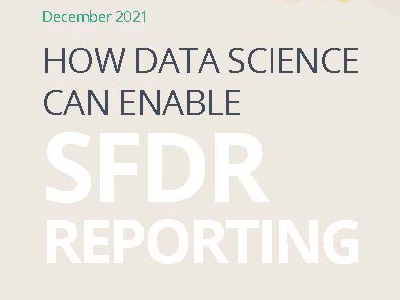

Wealth managers are likely to be up to speed with the requirements of the Sustainable Finance Disclosure Regulation (SFDR), a piece of EU legislation primarily intended to prevent asset managers and financial market operators from ‘greenwashing’ their investments. But understanding requirements and being able to properly deliver on them do not necessarily come hand in hand.
SFDR came into force last March, and was expanded on 1 January 2022 to include the requirement that wealth managers report on the “adverse sustainability impacts” of their investments. The regulation includes a sustainable investment category, requiring wealth managers to show that the underlying investments they offer – covering equities, real estate and sovereign bonds – really are contributing to a sustainable objective.
Similarly, wealth managers operating in the EU also need to be up to speed with the Taxonomy Regulation, which provides a common language to identify whether or not a given economic activity should be considered “environmentally sustainable”. Its provisions add to the burden for wealth managers, according to Victor Fernández, a senior product manager at Clarity AI, with more ‘objectives’ coming into force over the next year.
This August, for example, a new green amendment to the EU’s Markets in Financial Instruments Directive II (Mifid II) regulations comes into force requiring providers of financial products to check their customers’ preferences for environmental and sustainable investing – much like they already do for risk appetite.
“For wealth managers, this is one of the most concerning regulations,” says Fernández. “They will need to do this for every single client that they are working with.”
The price of failure
As the regulations bed in, Fernández expects the guidelines to become stricter. “The metrics in the regulations have a very precise and sometimes very complicated way of defining things, so wealth managers will need someone who has done this work to put in place the methodology and ensure it’s perfectly aligned with what the regulations require.”
In order for wealth managers to offer their clients a genuinely graded choice of investment options, scaled to varying levels of sustainability, an additional emphasis must be placed on the granularity, accuracy and authority of the ESG rating and reporting data. Failure to deliver puts wealth managers’ own businesses at jeopardy, but the fragmented, non-standardised nature of sustainability makes delivery no easy feat.
It should also be stressed that these rising pressures are not exclusive to the EU. Ángel Agudo, Clarity AI’s VP of product, makes the point that jurisdictions around the world are following the EU’s lead on much of this, in effect letting the Europeans do the bureaucratic groundwork.
“Most likely other countries will follow this as an example,” says Agudo. “Sooner or later, this will come to all wealth managers, regardless of jurisdiction.”
A global trend
In the UK, for instance, the government’s ‘Greening Finance: A Roadmap to Sustainable Investing’ document, published in October of last year, sets out a roadmap for a UK Green Taxonomy, stating that the government intends to make climate-related financial disclosures mandatory for companies from 2025. China, Japan, South Africa, Canada, Malaysia and Singapore are among other economies similarly developing their own taxonomies
Meeting this growing array of regulatory requirements means having access to accurate and comprehensive ESG data and ratings has never been more important for wealth managers.
More than this, wealth managers need access to authoritative data delivered in such a way that it can be aggregated to support their reporting needs to clients, as well as regulators. Amid all this complexity, simplicity is key. “Success in compliance, especially in ESG, is more about using automatic tools that will do most of the work for you,” says Fernandez.
Clarity AI is a sustainability tech platform that delivers insights on the social and environmental impact of over 30,000 companies, 180,000 funds, 198 countries and 187 local governments. Its SFDR solution provides coverage of 16 mandatory and 23 optional principal adverse impact indicators applicable to companies and sovereigns. Machine learning algorithms, with the support of in-house sustainability experts, ensure the data is of the highest quality and metrics are aligned with the SFDR definition. The platform’s EU Taxonomy solution leverages multiple data sources to achieve the highest level of coverage, accuracy and transparency, assessing more than 40,000 companies across 166 industries.
Investment in one’s future
As well as ensuring compliance, finding the right reporting solution offers a strategic opportunity for market players in wealth management that must not be overlooked, notes Agudo. An ability to offer clients bespoke services tailored to their specific requirements should provide a growing edge over companies that have their flexibility restricted by the limitations of their ESG data sources.
“We see the regulations as the starting point,” he says. “If wealth managers can offer greater granularity of information, they can be more sophisticated in their product offering.”
Indeed, ESG-related measurements are also strong indicators of the wider management qualities and commercial performance of a given investment, says Agudo, providing valuable insights into one’s investment decisions that go beyond ESG performance.
“Companies are more defined by their intangibles – not so much by the traditional accounting,” he explains. “How they are preparing for clean energy or treating their employees, or how their governance is, all tend to be better indicators of how things are going rather than from a traditional finance perspective. It goes beyond any implication of ESG, or doing good. To understand the core of the business, you have to take these dimensions into consideration.”
Having a platform in place to help gain clear, measurable and reliable data about the ESG performance of one’s investments is not just a regulatory requirement; it’s also an opportunity for wealth managers to future-proof their businesses and deliver better decision-making across their entire investment portfolios.
Learn more about why harnessing the best in tech can provide investors with new levels of reliability and transparency in ‘How Data Science Can Enable SFDR Reporting’.







